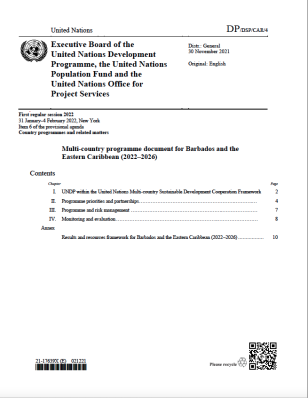Multi-Country Programme Document for Barbados and the Eastern Caribbean (2022–2026)

Multi-Country Programme Document for Barbados and the Eastern Caribbean (2022–2026)
pdf (0.3MB)
DownloadMulti-Country Programme Document for Barbados and the Eastern Caribbean (2022–2026)
February 7, 2022
The UNDP multi-country office in Barbados serves 10 Eastern Caribbean countries and territories, nine of which are part of the Organisation of Eastern Caribbean States (OECS). Classified as upper-middle-income or high-income countries by the World Bank, these small island developing states are characterized by narrow economic bases, high dependence on the tourism sector, declining development financing flows, lack of economies of scale, high import-dependence, lagging judicial sectors, limited fiscal space, high indebtedness and high vulnerability to natural disasters and climate change. Nine of these countries have identified as their national development priorities: generating economic growth, promoting human and social well-being and the sustainable use of natural endowments. In all countries, response to and recovery from the coronavirus disease (COVID-19) pandemic is an overarching priority.
The proposed programme encapsulates the UNDP contribution to the United Nations Multi-country Sustainable Development Cooperation Framework (UNMSDCF) 2022–2026 for the Caribbean subregion. The vision is to attain an inclusive, sustainable and full recovery from COVID-19 while restoring countries on a pathway to achieving the Sustainable Development Goals.
UNDP will focus efforts on:
(a) enhancing and promoting shared prosperity and resilient recovery that build national and community capacities to respond to and recover from shocks;
(b) improving the adaptive capacity of Caribbean institutions and communities for inclusive, gender-responsive disaster risk management, climate change adaptation and mitigation and sustainable blue economy development; and
(c) improving good governance systems, policies and capacities across the justice sector to support the rule of law, reduce crime, empower survivors, women and other vulnerable groups and enhance access to equal, reliable and timely justice.

 Locations
Locations




